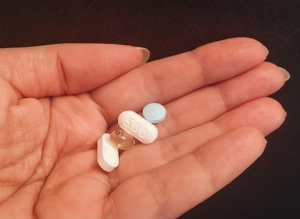Eating with diabetes: should you go keto?
Published 8 Mar 2024 • By Laury Sellem
Low-carb diets, such as the ketogenic diet, consist of reducing daily carbohydrate consumption. These diets are often promoted for weight loss or health management and are widely popular.
Can they also help people with diabetes manage their condition? Are they safe to follow for everyone?
Keep reading to find out!

Keto or low-carb diet?
Low-carb diets usually consist of reducing daily carbohydrates to 20-130g per day and come in many shapes and sizes. They have been popular for decades and promoted under various names: the “cabbage soup” diet in the 1950s, the Atkins diet in the 1970s, and more recently the ketogenic (“keto”) diet which still has a strong worldwide community of followers to this day. The ketogenic diet is considered as a “very low-carb diet”, and typically allows 20 to 50g of carbohydrates per day. In practice, this means limiting the consumption of carbohydrate-rich foods such as grains, starchy vegetables, fruits, and processed foods with added sugar to a minimum. Instead, one’s energy would mostly come from protein-rich foods (e.g. meat, fish, eggs, and soy-based foods), fat-rich foods, and starch-free vegetables.
Keto diet and weight loss for diabetes management
Although not all patients with type 2 diabetes are overweight or obese, weight loss remains the cornerstone of diabetes management for those who are. In particular, Diabetes UK recommends overweight and obese patients lose 15kg in the first year after diagnosis to help achieve diabetes remission. Low-carb diets, including the ketogenic diet, have been linked to weight loss. Indeed, the high protein content of a keto meal may help feeling full for longer, hence reducing overall calorie consumption throughout the day. However, it is important to note that the key to sustainable weight loss is to reduce calorie consumption slowly but steadily over a long period of time. This usually means building new dietary habits that can be maintained in the long run. While following a keto diet may be the best way to achieve this for some people, it is not a one-size-fits-all approach – some people may prefer to keep carbohydrates in their diet and still achieve similar results.
Keto diet and blood sugar levels
As blood sugar levels (i.e. “glycaemia”) are directly linked to carbohydrate consumption, low-carb diets, including the keto diet, have been extensively studied in relation to the glycaemic control in diabetic patients. Some studies have observed improvements in markers of glycaemic control after following a low-carb diet between a few weeks and few months. Nonetheless, there is no clear evidence that following a keto diet helps sugar level management in the long term, probably because many patients struggle to maintain a low-carb diet in the long run.
Is the keto diet risk-free?
Getting started with a keto diet often means important changes in daily meals – diabetic patients who cut carbohydrates almost entirely suddenly need to rely on proteins and fat to meet their daily energy needs. Unfortunately, keto dieters who rely heavily on saturated fat-rich foods (e.g., butter, processed meat, coconut fat, or processed foods enriched in palm oil) risk increasing their blood cholesterol levels (called “LDL-cholesterol”) and, in the long-run, their risk of heart disease. As people with diabetes are already at increased risk of cardiovascular disease, it is crucial for them to plan a heart-friendly keto diet.
In addition, following a keto diet while being under diabetes treatment may lead to dangerous side effects, such as hypoglycaemia or, more rarely, ketoacidosis. Therefore, it is important that patients under treatment seek the support of their doctor or a registered dietitian to plan a safe low-carb diet that will minimise the risk of such side effects.
Planning a heart-friendly keto diet
To keep cardiovascular disease risks in check, it is important to carefully plan the composition of a keto diet. Ideally, this would be done with the support of a nutrition professional, such as a registered dietitian or nutritionist. Nonetheless, here are some general tips that may help people with diabetes make safer food choices:
- Prefer unsaturated fat over saturated fat. Reducing saturated fat is one of the most effective dietary changes to maintain low LDL-cholesterol levels and prevent cardiovascular disease. This means limiting foods such as butter, processed meat (e.g. sausages, bacon), coconut fat, or palm oil-rich foods. Instead, meals can include sources of mono- and polyunsaturated fats such as vegetable oils, fatty fish (e.g. salmon, mackerel), and fatty fruits (e.g. avocado, olives).
- Choose high-fibre sources of carbohydrates. Consuming high-fibre food has multiple benefits on health, such as contributing to lower LDL-cholesterol levels and reducing heart disease risk. When planning the carbohydrate allowance of a keto diet, it can thus be helpful to choose fibre-rich food such as leafy greens, cauliflower, cabbage, or artichoke.
- Introduce plant stanols and sterols in daily meals. Also called phytosterols, they have a similar structure to dietary cholesterol from animals, although their consumption can help reduce LDL-cholesterol blood levels. They are now widely available in fortified milks, yogurts, and fat spreads and can thus replace conventional dairy foods.
- Consider soy proteins. Packed with 8.1g of protein per 110g, tofu (along with other soy-based foods) can be an excellent low-carb source of protein. A recent review of 46 intervention studies have suggested that consuming 25g of soy proteins over six weeks may reduce LDL-cholesterol levels by 3 to 4%. They can be consumed as tofu, soybeans, or tempeh, and are very versatile in addition to being a great alternative to meat in cooked dishes.
Last words
- The ketogenic diet promotes the reduction of carbohydrates to a minimum, in favour of protein and fat-rich foods. It is widely popular and benefits from important media coverage, mostly due to its weight loss-boosting effect.
- Weight loss is a cornerstone for diabetes management in overweight and obese patients. While following a keto diet might be a way to achieve weight loss, it is not sustainable for everyone.
- As people with diabetes are often at increased risk of cardiovascular disease, a ketogenic diet should be carefully planned to remain heart friendly. This includes consuming foods rich in unsaturated fat, fibres, phytosterols, and/or soy proteins.
- A keto diet often leads to important lifestyle changes for patients and may lead to dangerous side effects. It is crucial to seek the support of a doctor or a registered nutrition professional when planning to start a keto or a low-carb diet.
Take care!
Sources :
- The History of Low Carb – Dietetically Speaking
- Oh R, Gilani B, Uppaluri KR (2022) Low Carbohydrate Diet. In: StatPearls. StatPearls Publishing, Treasure Island (FL)
Clinical Uses for Low Carbohydrate Diets – Dietetically Speaking - Dyson PA, Twenefour D, Breen C, Duncan A, Elvin E, Goff L, Hill A, Kalsi P, Marsland N, McArdle P, Mellor D, Oliver L, Watson K. Diabetes UK evidence-based nutrition guidelines for the prevention and management of diabetes. Diabet Med. 2018 May;35(5):541-547. doi: 10.1111/dme.13603. PMID: 29443421.
- Zhou C, Wang M, Liang J, He G, Chen N. Ketogenic Diet Benefits to Weight Loss, Glycemic Control, and Lipid Profiles in Overweight Patients with Type 2 Diabetes Mellitus: A Meta-Analysis of Randomized Controlled Trails. Int J Environ Res Public Health. 2022 Aug 22;19(16):10429. doi: 10.3390/ijerph191610429. PMID: 36012064; PMCID: PMC9408028.
- Snorgaard O, Poulsen GM, Andersen HK, Astrup A. Systematic review and meta-analysis of dietary carbohydrate restriction in patients with type 2 diabetes. BMJ Open Diabetes Res Care. 2017 Feb 23;5(1):e000354. doi: 10.1136/bmjdrc-2016-000354. PMID: 28316796; PMCID: PMC5337734.
- Scientific Advisory Committee on Nutrition (SACN) (2019) Report on Saturated fats and health
Griffin BA, Mensink RP, Lovegrove JA (2021) Does variation in serum LDL-cholesterol response to dietary fatty acids help explain the controversy over fat quality and cardiovascular disease risk? Atherosclerosis 328:108–113 - BDA Low carbohydrate diets for the management of Type 2 Diabetes in adults. Accessed 01 Mar 2024.
- Scientific Advisory Committee on Nutrition (SACN) (2019) Report on Saturated fats and health.
- Brown L, Rosner B, Willett WW, Sacks FM (1999) Cholesterol-lowering effects of dietary fiber: a meta-analysis. Am J Clin Nutr 69:30–42.
- Threapleton DE, Greenwood DC, Evans CEL, et al (2013) Dietary fibre intake and risk of cardiovascular disease: systematic review and meta-analysis. BMJ 347:f6879.
- Demonty I, Ras RT, van der Knaap HCM, et al (2009) Continuous dose-response relationship of the LDL-cholesterol-lowering effect of phytosterol intake. J Nutr 139:271–284.
- Public Health England (2021) McCance and Widdowson’s - The Composition of Foods Integrated Dataset (CoFID) 2021.
- Blanco Mejia S, Messina M, Li SS, et al (2019) A Meta-Analysis of 46 Studies Identified by the FDA Demonstrates that Soy Protein Decreases Circulating LDL and Total Cholesterol Concentrations in Adults. J Nutr 149:968–981.
Comments
You will also like

Fighting schizophrenia symptoms: a long journey against paranoia after detainment and denial
12 Dec 2018 • 7 comments

 Facebook
Facebook Twitter
Twitter

